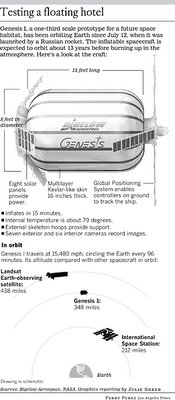 The biggest gambler around these days is not a high roller going all in with a pair of deuces. He's a real estate magnate who's betting $500 million that he can open the first inflatable motel in outer space. As far out as the idea sounds, multimillionaire Robert Bigelow has already launched a one-third scale model of his inflatable space module called Genesis I. The spacecraft was launched in July atop a Russian rocket.
The biggest gambler around these days is not a high roller going all in with a pair of deuces. He's a real estate magnate who's betting $500 million that he can open the first inflatable motel in outer space. As far out as the idea sounds, multimillionaire Robert Bigelow has already launched a one-third scale model of his inflatable space module called Genesis I. The spacecraft was launched in July atop a Russian rocket."I'm on cloud nine," Bigelow said at his production facility in North Las Vegas, where his team of engineers was tracking the spacecraft after it inflated and entered an orbit 348 miles above Earth. A second launch is in the works, Bigelow said. A full-scale module is scheduled for orbit within five years and in less than a decade, paying guests could be checking in. By Earth standards, they won't be getting much for their estimated $8-million weeklong vacation package: no Jacuzzi, no room service, no mints on the pillow. But then, the best hotel in Paris can't match the view of Earth spinning below as the sun rises and sets every 90 minutes.
Bigelow, a trim 62 with swept-back salt-and-pepper hair, is part of a new breed of entrepreneurs out to break the government monopoly on space exploration. Along with aerospace entrepreneurs Burt Rutan, Elon Musk and others, Bigelow believes there's no reason capitalism can't work in zero gravity. Though Rutan and Musk are building rockets and space planes, Bigelow believes his inflatable space modules could serve as hotels, conference centers, even sporting complexes where hang-time would be measured in minutes instead of seconds.
Bigelow, who made his fortune with the Budget Suites of America hotel chain, acknowledges there are some big hurdles. Chief among them is the economics of rocketing people into space. So far, only the super-rich, such as multimillionaire investor Dennis Tito, have been able to afford the $20 million price tag for a stay at the International Space Station. (excerpts from an article by John Johnson, Jr.)
No comments:
Post a Comment